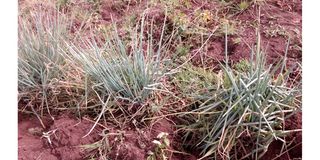Onion farmers stare at huge losses as the dry spell persists

An onions farm in Kerelwa village, Ortum, West Pokot County. Onion farmers have decried poor prices and low harvests as a result of poor climatic conditions.
Onion farmers in the North Rift region are staring at huge losses due to the prolonged dry spell in the region.
Those in Ortum, West Pokot County, have decried poor prices and low harvests as a result of the climatic conditions.
More than 80 percent of them depend on onion farming for their livelihoods and the drop in production and poor prices have hurt their incomes.
The typical long rains in Kenya have not been experienced in semi-arid areas, with many parts witnessing windy and sunny conditions for most of March and in April so far.
Rainfed
Because of these dire conditions, farmers are unable to salvage their crops and the planted ones have failed to germinate. The bulk of farming in the region is rain-fed.
The prolonged drought in West Pokot and Elgeyo Marakwet counties has made it hard for farmers to plant crops, threatening their agricultural potential and food security.
Environmentalists have attributed the delay in the onset of rainfall to the destruction of the environment, resulting in climate change.
Rain in the region was expected to start in March but it failed.
Dams appeal
David Dokosi, a farmer in Ortum, West Pokot County who grows onions on a half-acre farm, appealed to the county and national governments to devise mitigation mechanisms and cushion farmers against the harsh effects of drought.
The farmer appealed to the county government to construct dams to harvest water during the rainy season to save farmers during dry seasons.
Mr Dokosi, who has grown onions for the last 15 years, said this is his worst experience. He will harvest just 2,000kg, the lowest production since he began farming.
He harvests up to 15,000kg and sells a kilo for Sh35.
“I have spent over Sh80,000 on inputs but I expect poor returns unless the price shoots up,” he said.
Exploitation by brokers
Farmers in the region face numerous challenges, including poor prices and exploitation by brokers, who buy the farm produce and transport it to Mombasa, Nairobi and Western Kenya, among other places.
They challenged the county government to look for a ready market for onion farmers and subsidised inputs like fertilisers and seeds to cushion them from losses.
The ideal market price per kilo of onion is Sh75, meaning an acre that produces 15,000kg could fetch up to Sh1 million.
Eliud Cheberi, a farmer in Marakwet West, said the season started well but the prolonged dry spell is a threat.
“The dry spell has exposed us to difficult times and some farmers who planted their seeds have not seen them germinate,” he said.
Poor yields
Jonathan Kibet Rono, another farmer, said they are anticipating poor yields at the end of the season.
A 50kg bag of fertiliser sells for between Sh3,300 and Sh3,900, depending on where one purchases it.
Without subsidies, most farmers skip the use of the much-required fertilisers, hence affecting yields.
West Pokot Governor John Lonyangapuo said the delayed rains will affect yields. The governor encouraged farmers to move away from rain-fed agriculture and embrace irrigation.
He said farmers also need to be encouraged to plant drought-resistant crops to help cushion them in such situations.
Prof Lonyangapuo said the entire Rift Valley region, known as the country’s food basket, has been affected by the dry spell, and this would affect food prices come next year.
Dry planting
West Pokot County Meteorological Officer Wilson Lonyang’ole has advised farmers in highland areas of the county to start preparing land for planting their crops but on a small scale.
He noted that little rainfall is expected in the county.
“The moistures will build up from the Atlantic Ocean to West Pokot, Western and Cherangany,” he said.
Lowland areas will experience normal to below normal distribution of rainfall.
Areas like Siyoi, Lelan, upper Chepareria, Kapenguria, Mnagei, Kishaunet, Cherangany and some parts of Uganda are expected to receive normal rainfall.
“Farmers in these areas should do dry planting. Let them prepare land but wait for our advisory,” he said.
He advised farmers to work with the Ministry of Agriculture on the right type of seeds to plant. He also suggested planting fast-maturing drought-resistant crops.
“They should know what seeds to plant to suit the season. We want them to plant short-seasoned crops,” Mr Lonyang’ole said.





